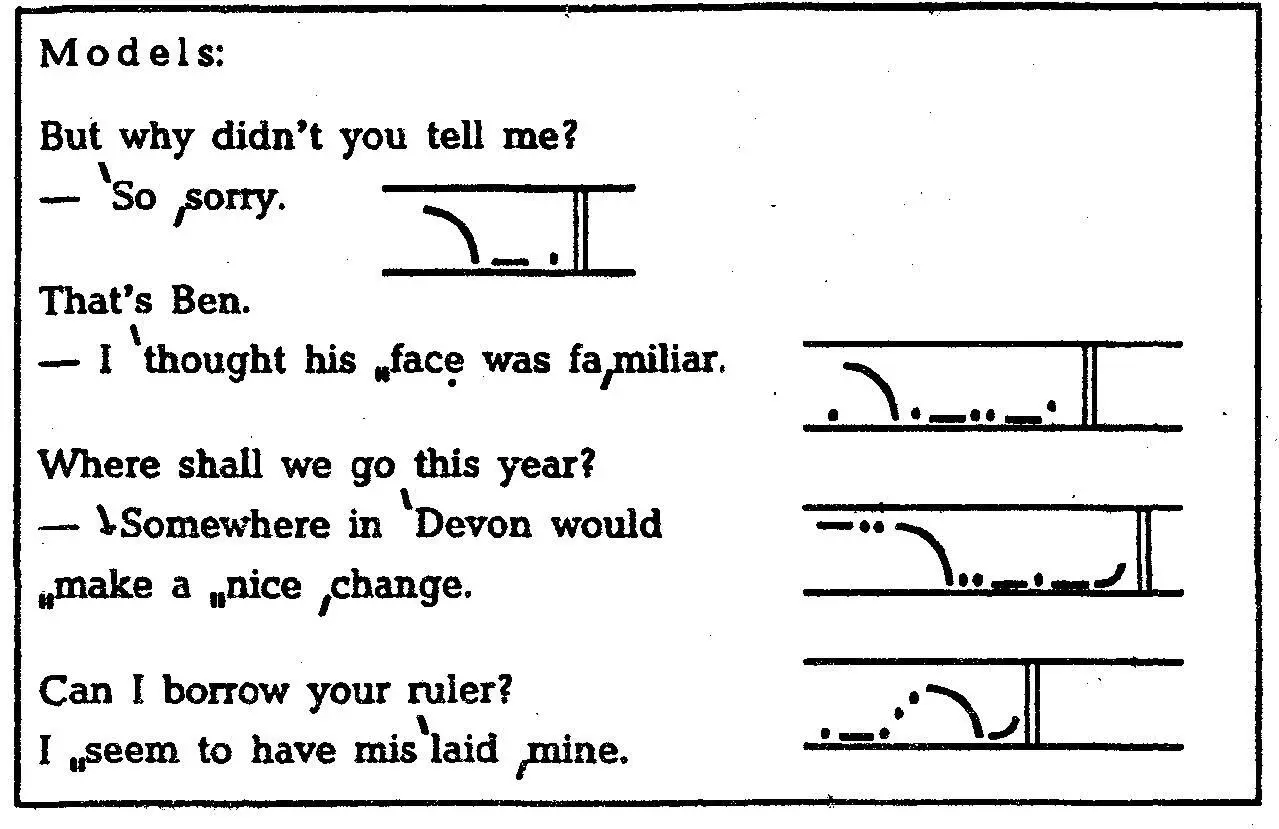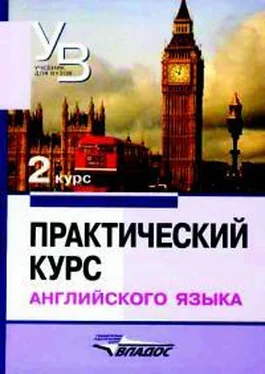— And to follow?
— A grilled steak with baked potatoes and peas,
— Will you have anything to drink, sir?
— Well, I'm rather thirsty. Bring me half a pint of bitter. What about you, darling?
— Well, I don't care for beer, but I will have a glass of cherry.
— Very good... What sweet would you like?
— I'll have fruit salad.
— So will I. And we'll have two coffees, please.
— Black or white?
— White, please. Oh, and two liqueur brandies.
— What a lovely waltz they are playing. Shall we dance?
— Yes, I'd love to...
— Waiter! The bill, please.
— Very good, sir.
— Here you are.
— Thank you very much, sir.
15. Make up a dialogue of your own, using some of the phrases of the dialogue
above.
16. This exercise is meant to develop your ability to read and retell a story with
correct intonation.
a) Listen to the story "Insufficient Local Knowledge" carefully, sentence by sentence.
Mark the stresses and tunes. The teacher will help you to correct your variant. Practise
reading your corrected variant.
b) listen carefully to the narration of the story. Observe the peculiarities in intonation-
group division, pitch, stress and tempo. Note the use of temporizers. Reproduce the model
narration you have listened to.
17. This exercise is meant to test your ability to analyze and reproduce
material for reading and retelling.
a) Read the joke silently to make sure you understand each sentence. Underline the
sentence expressing the essence of the joke. Split up each phrase into intonation groups if
necessary. Locate the communicative centre of each sentence. Mark the stresses ana tunes,
concentrate your attention on the attitude expressed. It is not expected that each student will
mark the story in exactly the same way. Discuss your variants in class. The teacher will help

you to choose the best variant. Practise your corrected variant for test reading,
b) Retell the joke in your own words:
The father of a family, who was angry with his children because they were displeased with
their food, exclaimed angrily one day at dinner: "You children are intolerable; you turn up your
noses of everything. When I was a boy, I was often glad to get dry bread enough to eat." "Poor
papa," said Rose, "I'm so glad you are having such a nice time now living with mama and us."
SECTION FIVECompound Tunes FALL + RISE
All the tunes containing more than one nuclear tone are called compound.
The Fall + Rise is a combination of the High Fall and the Low Rise.
The fall and the rise always occur on separate syllables. The fall starts from a very high level
and ends very low. Any syllables occurring between the High Fall and the Low Rise are said on a
very low pitch. Notional words are stressed. The falling part marks the idea which the speaker wants
to emphasize and the rising part marks an addition to this main idea.
The combination of the High Fall with the Low Rise is used in sentences expressing highly
emotional reaction to the situation. It is often heard:
1 . I n s t a t e m e n t s , sounding apologetic, appreciative, grateful, regretful,
sympathetic, persuasively reassuring, pleading, plaintive.
е.g.
Whose turn is it then? — It's `mine ,actually.
How did this get broken? — I'm most `terribly ,sorry.
2 . I n q u e s t i o n s :
a) I n s p e c i a l questions, sounding plaintive, pleading, weary, despairing;
sometimes warm, sympathetic.
е.g. Sorry I'm late. — Oh why „can't you „come on /time for once?
b ) I n g e n e r a l questions, conveying a plaintive, pleading, sometimes impatient
tone.
е.g. He played very badly today. — Will he ever be any ,better d'you think?
3 . I n i m p e r a t i v e s , sounding plaintive, pleading, reproachful.
е.g. It's all so depressing. — `Cheer ,up. (It can't „last for ,ever.)
I've nothing to do with it. — Now `do be ,reason-able, Charles.
4 . I n e x c l a m a t i o n s , warm, sympathetic, encouraging, sometimes
plaintive, puzzled, surprised.
Greetings and leave-takings sound pleasant and friendly being pronounced this way.
е.g. Good night, Peggy. — Good night, Mrs. ,Smith. See you on Friday. — Right you ,are!
EXERCISES
1. Listen carefully to the following conversational situations. Concentrate your attention
on the intonation of the replies:
Verbal Context
Dril
Statements
(sounding apologetic, appreciative, grateful,
regretful, sympathetic, persuasively reassuring,
pleading, plaintive)
Don't you like it?
I don't, frankly.
Any news of Tim?
He's coming home soon.
Haven't you finished it yet?
I've only just begun it, as a matter of fact.
It looks like rain, I'm afraid.
Perhaps it would be better to stay at home in that
case.
I've had it six years now.
You'll be buying a new one soon, I imagine.
Whyever bring a mac?
It was raining when I left this morning.
I thought of going for a stroll.
I'll come too, if I may.
It was quite an accident
But I told you not to touch it.
So it was you who borrowed my
I do hope you didn't mind.
spade.
He's accepted your offer.
I didn't dream he'd take me seriously.
It's a wonderful photo.
I knew you'd like it.
Help? Certainly.
I was sure I could count on you.
But why didn't you tell me?
So sorry.
I thought you ought to know.
Thank you for telling me, I do appreciate it.
I really must go now.
I do hope you have a comfortable journey.
It's all so discouraging.
I know exactly how you feel.
Sorry I haven't returned it yet.
That's quite all right. I'm in no particular hurry for
it.
I've already been waiting a year.
Then surely a few more days won't make much
difference.
It's an absolute scandal.
There's no need to get so worked up about it.
I do wish he'd mind his own
But he was only trying to be helpful.
business.
What's happened to Jack?
It's always the same. He's hardly ever on time.
I'm afraid he failed his exam.
I'm not at all surprised. He did absolutely no work
for it.
Special questions
(sounding plaintive, pleading, weary,
despairing, arm,sympathetic)
It was my treat.
How much was it?
How big did you say it was?
Oh, why don't you listen, Charley?
Three thousand he paid for it.
When will the poor fool learn wit?
Did you call, Frank?
Yes, what's the time please?
I have to go out now.
When will you be back, d'you think?
General questions
(sounding plaintive, pleading, sometimes
impatient)
Perhaps I could help.
Do you think you соuld?
Come and have a game, Phil.
Will you stop bothering me? Can't you see I'm
busy?
May I have another bun?
Читать дальше






![Владимир Аракин - Практический курс английского языка 3 курс [calibre 2.43.0]](/books/402486/vladimir-arakin-prakticheskij-kurs-anglijskogo-yazyk-thumb.webp)






